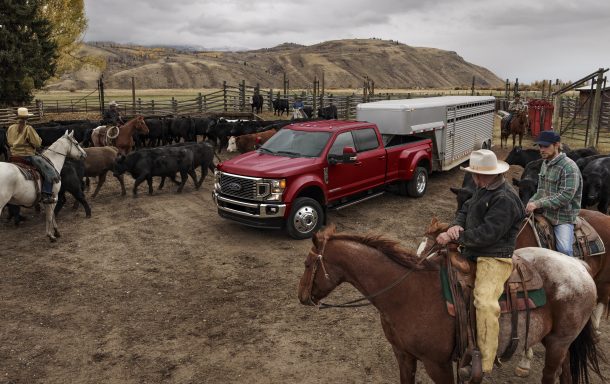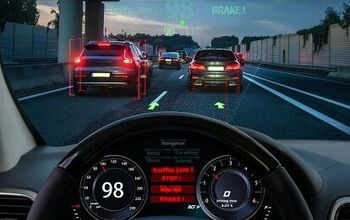Ford Says Electric Super Duty Trucks Aren't Happening

While Ford’s F-150 is slated for electrification, Super Duty versions of the F-Series are not. On Monday, the automaker told industry analysts that HD EVs weren’t in the cards — adding that customers can still expect all-electric versions of the Mach-E “Mustang” and Transit van.
“Our goal is to build a profitable electric vehicle portfolio,” John Lawler, Ford chief financial officer, explained during the forum hosted by Dan Levy of Credit Suisse. “To do that, we need to leverage our strengths and the scale that we have. We’re being very strategic about the platforms that we choose.”
Why bother building a non-competitive HD pickup to a customer base that only cares about whether or not it can haul 35,000 pounds for the entire day? The energy density of modern electric cars simply isn’t there, resulting in a hypothetical pickup that could theoretically haul monstrous loads a relatively short distance before needing to recharge. We doubt such a vehicle was even seriously considered by Ford after it crunched the numbers. Prohibitive development costs combined with gaps in battery technology undoubtedly killed the concept before it got off the ground.
According to the Detroit Free Press, any reasonable doubts to the contrary were removed by Kumar Galhotra, president of Ford Americas and International Markets Group. “At the moment, we do not have any plans to go into heavy duty with battery-electric vehicles,” he said.
That will change the second Ford thinks it’s profitable, however. CEO Jim Farley indicated that the automaker was interested in selling EVs to the commercial market, and not just private sales, during Ford’s third-quarter earnings call. If there’s a sudden leap forward in battery tech that can facilitate heavy-duty work without nullifying range and a customer base to sell to, Ford will probably begin development.
[Image: Ford Motor Co.]

A staunch consumer advocate tracking industry trends and regulation. Before joining TTAC, Matt spent a decade working for marketing and research firms based in NYC. Clients included several of the world’s largest automakers, global tire brands, and aftermarket part suppliers. Dissatisfied with the corporate world and resentful of having to wear suits everyday, he pivoted to writing about cars. Since then, that man has become an ardent supporter of the right-to-repair movement, been interviewed on the auto industry by national radio broadcasts, driven more rental cars than anyone ever should, participated in amateur rallying events, and received the requisite minimum training as sanctioned by the SCCA. Handy with a wrench, Matt grew up surrounded by Detroit auto workers and managed to get a pizza delivery job before he was legally eligible. He later found himself driving box trucks through Manhattan, guaranteeing future sympathy for actual truckers. He continues to conduct research pertaining to the automotive sector as an independent contractor and has since moved back to his native Michigan, closer to where the cars are born. A contrarian, Matt claims to prefer understeer — stating that front and all-wheel drive vehicles cater best to his driving style.
More by Matt Posky
Latest Car Reviews
Read moreLatest Product Reviews
Read moreRecent Comments
- SCE to AUX "...to help bolster job growth and the local economy"An easy win for the politicians - the details won't matter.
- Kjhkjlhkjhkljh kljhjkhjklhkjh so now we will PAY them your tax money to build crappy cars in the states ..
- SCE to AUX Yes, I'll miss it, and it doesn't make sense to kill off your 3rd-best seller. 2023 was its best year since 2018.
- SCE to AUX This was the same car I had (05 xB, stick, "camouflage" color) for 7 years - great car.We called ours "The Lunchbox". I added aftermarket wheels, and the 3rd-party cruise control the dealers could install.It suffered only two failures: bad window switch in week 2 (dealer fixed in 1 hour), bad trailing O2 sensor (fixed myself for $70). Fuel economy was always 28-34 mpg.It was a potential death trap, and ride quality became unbearable after 2 hours. I once did a 10-hour round trip in it and could barely walk after.Traded it for a 2012 Leaf, which was a better car in some ways.
- Bd2 The "e" nomenclature signifies the e-ATPs which BMW is pursuing.


































Comments
Join the conversation
Ford needs to dedicate one brand to the electric vehicles, sort of like what GM is doing with Cadillac. Maybe they can bring back Mercury. If it flops, just send it back to the dustbin of history. If it takes off, then pat yourself on the back for having such foresight and daring. Heck, start with an electric Ranchero or Ranger pickup. Price it affordably, put the maximum possible battery in it, and watch them fly off the showroom floor.
We're talking about an approx 5,000 lbs battery (the Tesla 3 has a 1,000+ lbs battery) for a net gain of about 4,000. This in a class limited to 14,000 lbs. The EV crew/4X4/Dually F-350 would weigh very close to that limit with the driver.